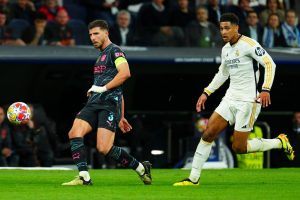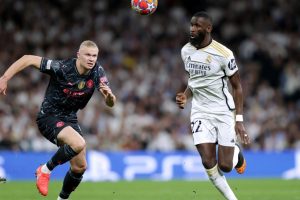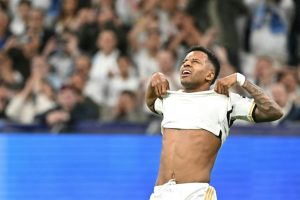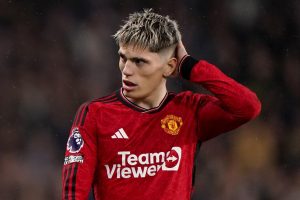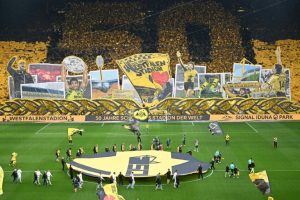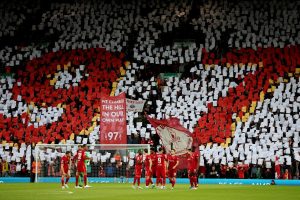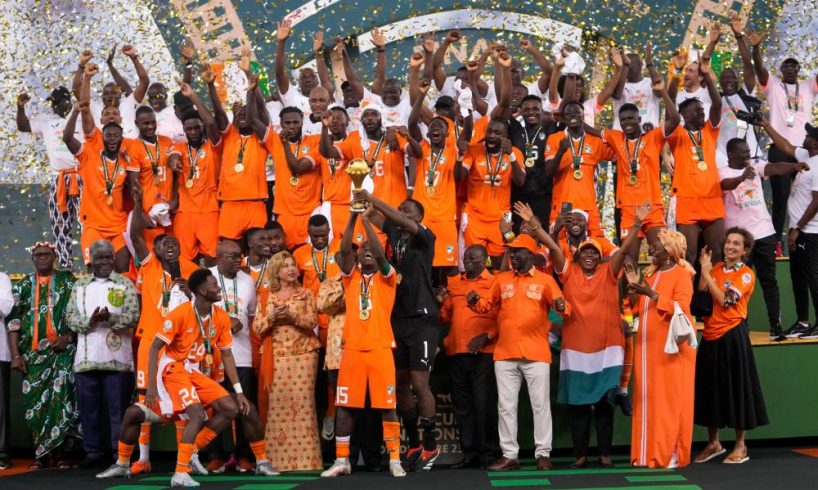
Ivory Coast’s Max-Alain Gradel lifts the trophy after winning the Africa Cup of Nations final against Nigeria.Photograph: Sunday Alamba/AP
It turns out the zombie team really couldn’t be killed after all. The dead kid doesn’t fear the knife. Ghosts don’t feel pain. There was no way to prevent Ivory Coast from winning the Africa Cup of Nations for the third time. League formats excepted, no side had won a major tournament after losing twice, but it was more than those defeats by Nigeria and Equatorial Guinea in the group phase. Three times in the knockout stage they were behind and each time Emerse Faé’s side came back to prevail. Nobody could pretend this Ivory Coast team is one of the great sides, but this was one of the great tournament wins.
Nobody would set out to win a tournament this way, qualifying from their group as the fourth of four best third-place sides, sacking the coach, doing – at least if almost every player interview since is to be believed – a lot of looking in the mirror. But maybe this is the most fun way to win, amid chaos and disbelieving laughter and an inextinguishable will.
Related: Nigeria v Ivory Coast: Africa Cup of Nations final – live
The roar at the final whistle was extraordinary, the 60,000-capacity arena, other than the green-and-white splodge of Nigerian fans, rising in one mass of orange joy. This was about football and an improbable triumph, but it was about far, far more. It is only 13 years since the end of Ivory Coast’s second civil war.
A huge banner had been unfurled before kick-off thanking the players (it was later replaced by an enormous flag showing an “elephant commando”, an extremely hench and apparently cheery pachyderm, clad in green combats, an orange vest and a natty cap). It’s impossible to place a value on such things and it will be a long time before anybody can calculate whether the $1bn-plus spent on the tournament and related infrastructure has been a net positive, but the last two weeks have, as the president Alassane Ouattara demanded, presented an image of unity. Now 82, he was surrounded by the cavorting players just before the trophy presentation; it’s safe to say he’s a strong favourite for next year’s general election.
Ivory Coast won their last-16 tie in Yamoussoukro, their quarter-final in the former rebel capital of Bouaké, their semi-final and final back in Abidjan, and the whole country has celebrated. Sporting success, and its reception, can never be more than a symbol, but sometimes symbols matter.
And the goal that won it, nine minutes from time, came from the forward who has experienced the greatest comeback of all. It’s only 18 months since Sébastien Haller was diagnosed with testicular cancer. Even to be in this squad represents something remarkable. An ankle injury kept him out of the group stage, but it was his introduction 17 minutes from time that turned the last-16 tie. He came on at half-time in the quarter-final and was instrumental there too. The semi-final, when he got the only goal, was his first start. And here, improvising adroitly, he guided in a cross from the darting Simon Adingra with his studs.
Jean-Louis Gasset, the 70-year-old Frenchman who was sacked after the group stage, may reflect that he didn’t have the advantage of a fit Adingra either. But equally he didn’t connect with his squad or the Ivorian people, didn’t create the same sense of purpose. Nor did he pick the central midfield three of Jean Michaël Seri, Franck Kessié and Seko Fofana, whose control of games was the reason – if there was a reason beyond fate – that Ivory Coast triumphed.
It was Kessié who headed the equaliser from Adingra’s cross just after the hour. But if there is praise for Ivory Coast and their extraordinary resilience, there must also be questions about Nigeria. It was no surprise they began cautiously: if ever there was an occasion to try to quieten the home crowd, this was it. And having dug in and survived the early Ivorian surge, they had their reward as William Troost-Ekong headed in his fourth goal of the tournament, the first goal scored in any of the five finals in which Ivory Coast have played.
Nigeria are managed by the man José Mourinho describes as his best friend in football, José Peseiro. It’s easy to see why: the pair share a certain swagger, an unapologetic pragmatism. But trying to spoil and hold a lead in the classic Mourinho manner doesn’t really work in the modern game. Nigeria in the first half had defended with purpose and seemed to have a clear sense of how they would counter; in the second, trying to kill the game, they were overwhelmed and were then unable to change gear.
But perhaps trying to make sense of it all is futile. Some forces cannot be stopped. Ivory Coast’s golden generation strived for years to win the trophy; Faé, on the losing side in the 2006 final, has managed just four games but he’s already won Ivory Coast’s third Cup of Nations.

